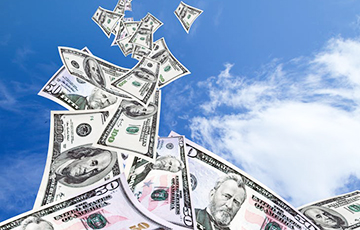Moscow Exchange Stops Trading In USD and EUR Trading
18- 13.06.2024, 8:47
- 14,330

Back to the '90s?
The Moscow Exchange (MOEX) announced the cessation of trading in the dollar and euro after the US Treasury placed it on the sanctions list on Wednesday. It will be possible to sell currency in Russian banks in the same mode, the Russian Central Bank assures, the BBC writes.
The National Clearing Center (NCC) and the National Settlement Depository (NSD), which act as intermediaries in dollar trading in the Russian foreign exchange market, were also sanctioned.
As follows from the exchange's report, starting from June 13, "in the foreign exchange market and the precious metals market, trading is carried out on all mechanisms, with the exception of currency pairs with the US dollar and the euro."
Similar restrictions will apply in the stock and money markets, where settlements on derivatives with settlements in US dollars and euros are suspended.
More ruble fluctuations
The Moscow Exchange is an important part of the Russian financial system. Banks, businesses and investors buy and sell currencies there — dollars, euros and yuan. The Russian Central Bank, depending on the course of trading in the morning, set the ruble exchange rate. This rate then determined the rate at which the currency could be bought from banks.
New sanctions have actually broken this system. The Central Bank will now calculate the exchange rate based on reporting data and over-the-counter funds — exchange rate formation will become opaque.
"The main consequence will be a structural increase in the volatility of the ruble exchange rate," Alex Isakov, Chief Economist for Russia and Central and Eastern Europe at Bloomberg Economics, told the BBC.
Volatility means that the fluctuations of the ruble will be much stronger. After the outbreak of the war in Ukraine, many foreign investors left the Russian market, there was less money there, and because of this, the fluctuations of the ruble became much stronger. For example, in 2023, there was a prolonged fall of the ruble, which the authorities stopped literally manually. Now, apparently, the ruble will become even less stable.
Financial expert Sergey Romanchuk writes about the growth of spreads. This means that the difference between the selling rate and the buying rate of the currency will be higher — banks can make good money on this. He also expects the volume of currency trades to shrink even more.
"What will happen to trading in the yuan in the future is unclear," Romanchuk writes. He suggests that the Chinese authorities may not want to serve the Russian National Clearing Depository. Earlier, the media reported that Chinese banks are rechecking transfers from Russia to avoid secondary sanctions.
"This classic 'never happened — and here it is again': we have quite relaxed on the subject of sanctions of significant, not formal, but really significant — in the last about six months. So this happened, I would even say, a little unexpectedly: we can not say that we were all preparing for June 12 and monitoring, so it's still such a surprise. For the market, when there is a surprise, it is always a reason for greater volatility," said Sofia Donets, chief economist of T-Investments.
At the auction on the exchange, the ruble exchange rate almost did not react to the news about sanctions — it only slightly weakened to 89.2 rubles per dollar. In the bank applications, the difference between buying and selling is significant, but the rate has not yet grown so much. In Sberbank, the dollar could be bought on Wednesday evening for 90.4 rubles, and sold for 87.2 rubles. In T-Bank (formerly Tinkoff), dollars can be bought at the rate of 93.75 rubles.
"For the market as a whole — these sanctions are not a very big event, for an ordinary Russian — even a very small event. But for MOEX, this is a significant event," Donets believes.
Back to the '90s?
The Central Bank assured that nothing will change for the population: it is still possible to buy and sell currency, and funds in bank accounts will also be saved.
Banks also said that nothing would change, for example, this was reported by Sberbank. Financial companies also claim that their work will not be affected, for example, such statements were made by Alfa Investments.
Apparently, the main consequence is that the Russian financial system is deprived of a convenient and safe currency exchange tool. And this already has broader consequences for the economy, which is becoming more and more simplified after the outbreak of the war. But so far the consequences of this are difficult to notice.
Alex Isakov believes that a shortage of currency is unlikely to be expected. "Most likely, the main effect will not be a shortage of currency, but the fact that exporters and importers will increase transaction costs — the cost of currency exchange, transfers and so on," he said. In the long term, this will lead, according to him, to funds outflow and, again, a weaker ruble.
That is, companies and investors will be able to buy and sell currency, just not within the framework of the Moscow Exchange, which was a convenient and safe tool for such operations.
Romanchuk calls the cessation of trading on the Moscow Exchange in dollars and euros "back to the 90s." “Once upon a time, there was no electronic currency trading with centralized clearing, nevertheless! People were living!" he writes. He believes that there will be "an alternative electronic platform, but it will not be possible to repeat the success of the Moscow Exchange quickly."










